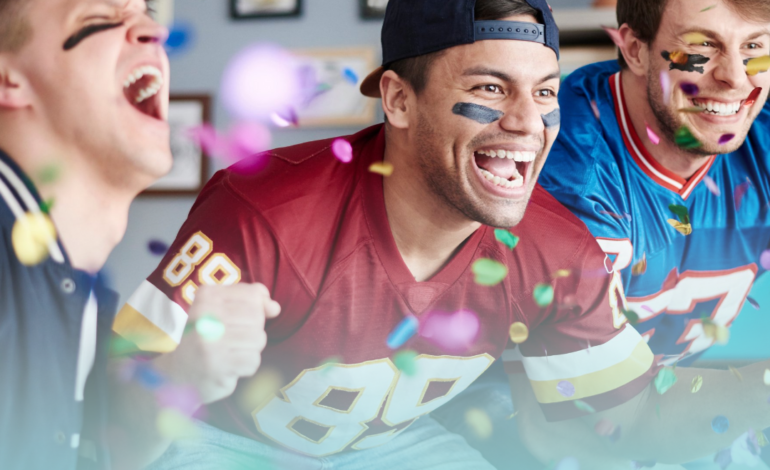Some of the biggest sports games, the Superbowl and March Madness, are rapidly approaching, and even if you are not a sports fan, there are so many other festivities that are focused around these games. Office draft brackets, the Super Bowl Halftime show and parties, and let’s not forget, the infamous Super Bowl commercials are all reasons why millions of Americans come together to celebrate, even if they are not sports fans.
Despite a global pandemic, 90 million people are planning to throw or attend a Superbowl party this year, increasing from 62.8 million people last year. Another 13.7 million adults plan to watch the game at a bar or restaurant. Total spending on food, drinks, apparel, decorations, and other purchases for the day is expected to reach $14.6 billion. Then soon after, March Madness begins. While March Madness house parties are not as common as Super Bowl house parties this year will see a significant rise in people getting together to watch the games. Office parties, sports brackets, and watching the game at a bar or restaurant are increasingly popular for this 4-week college basketball tournament. So, what does this mean if you are in recovery? Staying steadfast in your recovery is a daily routine. Attending special events such as a Super Bowl party or a March Madness office party should be no different; however, there are often temptations, especially when mixing sports games and alcohol.
Know your triggers
One of the critical components in recovery is learning the underlying triggers that drove you to misuse alcohol and/or drugs. Stress, specific situations, certain people, memories, emotions, and sensations are all triggers that can create the urge to misuse alcohol. The coping mechanisms you have learned in recovery to move past these triggers are essential tools that you most likely practice every day and attending a Super Bowl party should be no different. It is necessary to know which triggers are manageable and which ones you need to avoid altogether. If you choose to attend a Super Bowl or March Madness event, have a plan for managing cravings when they come up. Practicing mindfulness, calling a friend to talk, or simply taking a walk if things get intense are helpful strategies. But if going to a party with friends you used to party with is going to pose too big a risk, there is no shame in skipping the party this year and making other plans that align more with your recovery.
Be honest and kind with yourself and be willing to prioritize your recovery.
Host your own sober SuperBowl party
Consider hosting your own SuperBowl party at your home where you can stay strong in your sobriety. Make it a point to tell your guests that there will be no alcohol present, but there will be food and non-alcohol alternatives. This may be a fun event for your friends in recovery that are looking for a safe space to watch the game.
Hold a non-alcohol beverage in your hand
Sometimes the urge to drink alcohol is due to the old reflex reaction of the actual act of holding a beer and drinking it, especially in a social environment. To curb this urge, have a non-alcohol drink in your hand. This can be a virgin cocktail, a soda, or a glass of water. In all likelihood, other people will be too absorbed with the game to notice the contents in your glass. This will help you avoid well-meaning offers for “another beer” and make it easier to have a sober Super Bowl experience.
Be prepared to answer or respond to the question, “why are you not drinking?”
This question is not appropriate; it is asked frequently, especially in social situations where alcohol is being served. There are many reasons not to drink. Common ones include pregnancy and breastfeeding, taking medication, driving home after the party, not feeling well, no desire to drink, giving up alcohol temporarily for physical or mental health benefits, being in recovery, and many more. It is nobody’s place and none of their business to inquire why you are choosing not to drink at a party, but the reality is that this question most likely will be asked, so therefore it is vital to be prepared to answer this question. You should provide an answer that makes you feel comfortable. Maybe you are not comfortable talking about your recovery, and that is okay. Therefore, it is important to come up with another answer that makes you feel safe. Simply stating you choose not to drink today or do not want to drink, and drive are very appropriate answers. If you feel trapped at any time, excuse yourself from the conversation and go for a walk.
Tips for being a respectable and inclusive party host
Suppose you are hosting a Super Bowl party and you are not in recovery. In that case, it is important to be mindful that you may have guests in attendance who are in recovery or choosing not to drink alcohol for whichever reason. Being a warm, generous, and inclusive host is important but does not have to be complicated.
Offer non-alcoholic cocktails, sparkling water, or non-alcoholic beer
Don’t let anyone drive who is intoxicated
Respect anyone and everyone who chooses not to consume alcohol at your party
Avoid asking “why” someone is choosing not to consume alcohol.
About AKUA Mind and Body
AKUA Mind and Body is a full-service treatment center that provides residential treatment, partial hospitalization, intensive outpatient treatment, outpatient treatment, and virtual treatment to both men and women struggling with a substance use disorder, a mental health disorder, or both (co-occurring disorder). AKUA Mind and Body provides compassionate, evidence-based treatment to all individuals and families. We combine evidence-based medications and psychotherapy approaches with holistic therapies such as meditation, yoga, and equine therapy, as we believe in treating the mind, body, and spirit.
Our clinical staff and ancillary treatment teams take great pride in the care that we provide to our clients and their families. From intake to discharge, we believe in treating the client as an individual and not just treating the disorder. As a result, we provide individualized treatment plans for every client. We offer our treatment services across many locations in California, including Orange County, Newport Beach, San Diego, and Sacramento.



